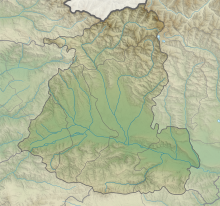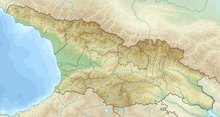Tsona Cave
Appearance
| Tsona Cave | |
|---|---|
| Location | Georgia |
| Coordinates | 42°29′41″N 43°40′46″E / 42.49472°N 43.67944°E |
| Length | 100 m (330 ft) |
| Discovery | 1958 |
| Geology | Jurassic sandstone formations |
Tsona Cave (Georgian: წონის მღვიმე) is an archaeological site at the head of the river Qvirila in proximity of village Tson (Georgian: წონა, Ossetian: Цъон) [1] in the Java Municipality in Shida Kartli in Georgia. The site is close to the Bouba[2]-Kakheri pass at south of the Caucasus range.[3][4]
History
[edit]Tsona Cave was discovered by A. Kalandadze in 1958. It was excavated by Kalandadze, Tushabramishvili and later by Z. Kikodze.[5]
The cave is located at 2100 m above sea level and therefore it is one of the highest archaeological cave sites in the country. Excavations at the site revealed Lower and Middle Paleolithic archaeological remains.[6]
References
[edit]- ^ Tsona, Georgia 42°28′06″N 43°42′55″E / 42.46833°N 43.71528°E
- ^ Peakfinder 42°27′34″N 43°39′06″E / 42.45944°N 43.65167°E
- ^ Mgeladze, A., Moncel, M.-H., The Acheulean in the South Caucasus (Georgia): Koudaro I and Tsona lithic assemblages, Quaternary International (2015), http://dx.doi.org/10.1016/j.quaint.2015.03.041
- ^ Tushabramishvili, D.M., 1978. Arkheologicheskie panyatniki Tsutskhvatskogo mnogoetajnogo peshernogo kompleska. Metsniereba, Tbilisi.
- ^ Kalandadze, A. N., and Tushabramishvili, D. M. (1978). Tsonskaya peshera (Tconskaya cave).In Arkheologiya i paleogeografiya rannego paleolita Krima i Kavkaza, Moscow, pp. 96– 100.
- ^ Mgeladze, A. (2008). Premières phases de peuplement dans le Caucase: étude des assemblages lithiques des sites géorgiens de Dmanissi (Pleistocène inférieur), de Koudaro I et de Tsona (Pleistocène moyen) (Doctoral dissertation, Paris, Muséum national d'histoire naturelle).


